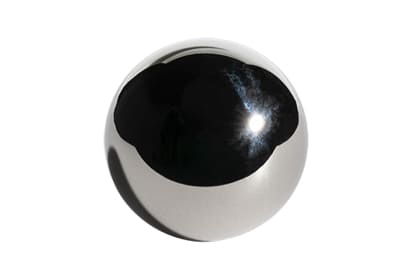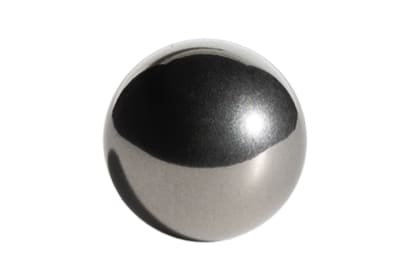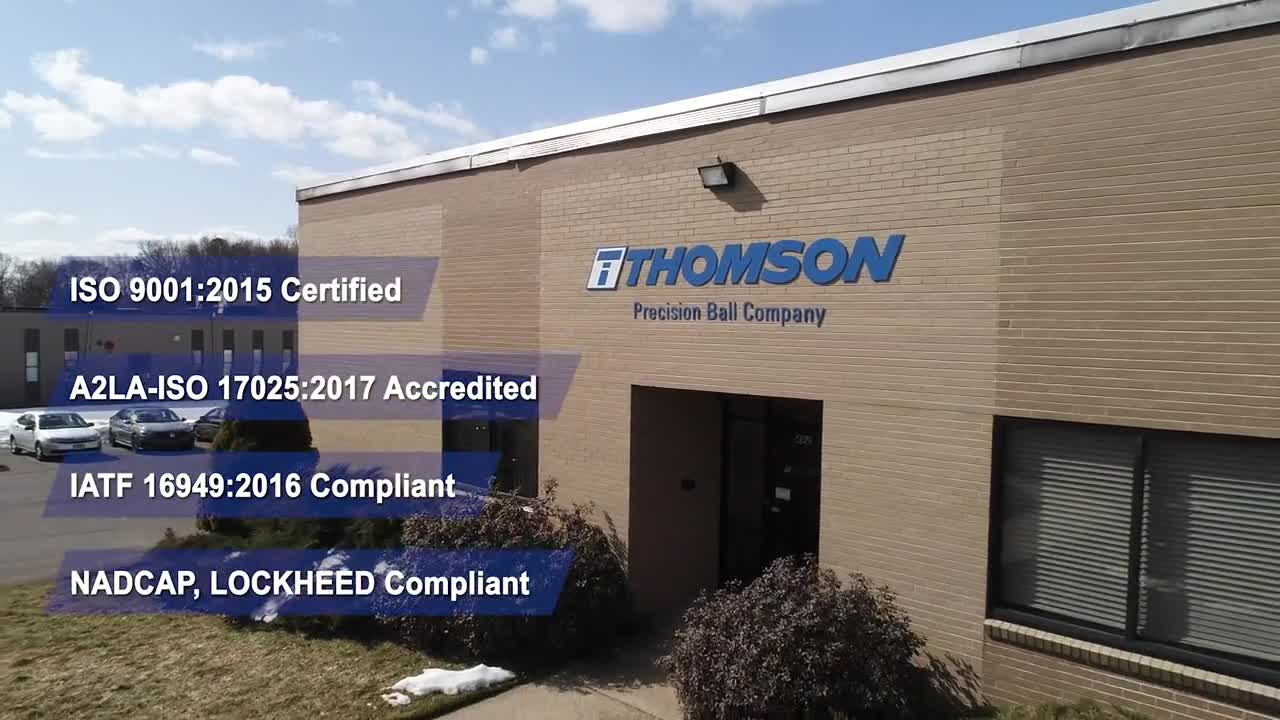Choose Your Login Account
Thomson currently has two account systems - one for the website and CAD model downloads, and one for e-commerce. We understand that two logins is an inconvenience and are working to consolidate our systems into one login process. Until we’re able to consolidate the two logins, please follow these guidelines:
- Download CAD models
- Save and retrieve projects in LinearMotioneering® and MicronMotioneering® tools
- Access Distributor Extranet and all related resources
- Order directly from Thomson online (North America only)
- Authorized Thomson Distributors can view and order from quotes online (Global)
- View the shopping cart and look up prior direct orders
Wählen Sie den Produkttyp

Chrom 52100
Auch als Chromstahl bekannt, ist 52100 ein extrem harter und verschleißfester Werkstoff mit hoher Belastbarkeit.

Hart-Edelstahl
Hart-Edelstahl der Serie 400 zählt zu den härtesten Edelstahlsorten nach der Wärmebehandlung. Er ist magnetisch.

Weich-Edelstahl
300er Edelstahl ist eine gute Allround-Lösung für eine breite Anwendungspalette. Er ist korrosionsbeständig bei hohen Temperaturen und gering bis nicht magnetisch.

Keramik
Für hohe Temperaturen oder Anwendungen, bei denen es auf Gewicht und Härte ankommt. Geringerer WärmeAusdehnungskoeffizient.

E52100
E52100 – auch als Chromstahl bekannt, ist 52100 ein extrem harter und verschleißfester Werkstoff mit hoher Belastbarkeit.

HCC DFARS
HCC DFARS – Chromstahl mit DFARS-Zertifizierung ist für Anwendungen in der Luft- und Raumfahrt gedacht.

HCC-Vakuumschmelze
HCC-Vakuumschmelze – Chromstahl mit aufwändiger Metallverarbeitung, damit das Material während des Schmelzvorgangs seine Reinheit behält.

440C
440C – 440er-Stähle sind die härtesten aller Edelstahlsorten, was sie sowohl abriebfest als auch korrosionsbeständig macht.

440C DFARS
440C DFARS – ähnlich wie 440C, entwickelt für die Luft- und Raumfahrt, DFARS-konform.

440C-Vakuumschmelze
440C-Vakuumschmelze – Chromstahl mit aufwändiger Metallverarbeitung, damit das Material während des Schmelzvorgangs seine Reinheit behält.

440A
440A –Edelstahl 440A hat ähnliche physikalische Eigenschaften wie 440C, mit einem geringeren Kohlenstoffanteil für bessere Bearbeitbarkeit.

420C
420C – Da Edelstahl 420C aufgrund seiner Eigenschaften in unterschiedlichsten Umgebungen beständig ist, ist er eine unserer vielseitigsten Optionen für eine breite Anwendungspalette.

BG-42
BG-42 – Kugellagerstahl mit VIM/VAR-Technologie. Das Besondere an BG-42 ist der Zusatz von Vanadium, das die Verschleißfestigkeit erhöht.

302
302 – ist nicht magnetisch und kann nicht mittels Wärmebehandlung gehärtet werden. Die Legierung 302 wird normalerweise im ungeglühten Zustand verwendet.

316L
316L – dieser Edelstahl enthält weniger Kohlenstoff und Molybdän als typischer 316er-Stahl, was bessere Korrosionseigenschaften und höhere Temperaturwerte bedeutet.

304
304- Hat eine gute Korrosionsbeständigkeit und Umformbarkeit. Die Sorte 304 ist nicht-magnetisch.

430
430 – Typ 430 ist ein kaltbearbeiteter, wirtschaftlicher rostfreier Werkstoff, der Korrosionsfestigkeit zu niedrigen Kosten bietet.
Siliziumnitrid
Siliziumnitrid – eine beliebte Wahl für Hochpräzisionsanwendungen. 60 % Gewichtsersparnis im Vergleich zu Stahl und bis zu doppelt so hohe Härte sowie 70 % geringerer Wärmeausdehnungskoeffizient.

Aluminiumoxid
Aluminiumoxid – Lagerkugeln aus Aluminiumoxid sind leichter, härter und korrosionsbeständiger, benötigen weniger Schmierung und haben eine geringere Wärmeausdehnung als ihre Pendants aus Stahl.

Zirkoniumdioxid
Zirkoniumoxid – hochfestes Material, das bei Temperaturen bis zu 537 °C gut funktioniert.
Werkstoff-Umrechnung
Thomson Präzisionslagerkugeln sind in einer breiten Auswahl an Werkstoffen für Ihre Anwendungen erhältlich. Wir verfügen über Standard- und Sonder-Werkstoffe – und die technische Erfahrung, um Sie bei der Werkstoffauswahl zu unterstützen.
| Industrie-Umgebung | Hydrauliköle (Petroleum) | Süßwasser | Salzwasser | Lebensmittelprodukte | Frucht- und Gemüsesäfte | Milch | Alkohol | Salzsäure (40 %) | Schwefelsäure( 40 %) | Phosphorsäure (40 %) | Salpetersäure (40 %) | Zitronensäure | Salmiakgeist | |
|---|---|---|---|---|---|---|---|---|---|---|---|---|---|---|
| Chrom 52100 | C | A | D | D | - | - | - | C | - | - | - | - | C | B |
| Edelstahl 440 C | B | A | C | C | B | - | A | A | D | D | A | A | A | A |
| Edelstahl 302 | B | A | B | B | A | - | A | - | - | - | A | - | - | - |
| Edelstahl 316 | B | A | A | A | A | A | A | A | D | D | A | A | A | A |
| Messing | C | B | C | C | D | - | C | C | - | D | D | - | D | - |
| Monel | C | A | A | B | D | C | C | A | D | - | C | - | - | A |
| Nylon | A | A | A | A | - | A | A | A | D | D | D | D | C | - |
| Viton | A | A | A | A | A | A | A | A | A | A | A | A | A | D |
| Keramik | A | A | A | A | A | A | A | A | C | D | C | A | A | A |
| Titan | - | - | - | - | - | - | - | A | C | C | - | A | A | - |
Thomson Precision Balls
Thomson Precision Balls ist seit über 60 Jahren der marktführende Hersteller von Standardpräzisionskugeln, Präzisionskugellagern und einzigartigen Edelstahlkugeln für spezielle Anwendungen. Warum Präzisionskugeln von Thomson? Auf diese Frage haben wir gleich drei Antworten: unser breites Angebot an unterschiedlichsten Präzisionskugeln, unsere Präzisionskugellager-Technologien und die hochwertigen Materialien, die wir für unsere Edelstahlkugeln verwenden.
Die verschiedenen Ausführungen der Präzisionskugeln von Thomson umfassen:
- Präzisionskugeln in unterschiedlichen Formen einschließlich von flachen, diagonal geschnittenen, kegel- und nadelförmigen Kugeln, die typischerweise als gehärtete Polier- und Formwerkzeuge eingesetzt werden.
- Gebohrte Präzisionskugellager in allen gängigen Größen, Bohrungstiefen (einschließlich Durchsteckbohrungen), Durchmessern und Materialien.
- Beschichtete Präzisions-Edelstahlkugeln ermöglichen es, bestimmte physikalische Eigenschaften zu verbessern, z. B. die Härte, Korrosionsbeständigkeit, Geräuschdämpfung und elektrische Eigenschaften.
- Hohle Präzisionskugeln werden für Anwendungen benötigt, bei denen ein möglichst geringes Gewicht eine Rolle spielt.
Die überragende Qualität der Produkte von Thomson basiert auf einer Reihe von speziellen Technologien zur Fertigung von Präzisionskugellagern und Edelstahlkugeln.
- Ein A2LA-zugelassenes Kalibrierungslabor sorgt für effektive, effiziente und präzise Kalibrierungen, um die regelmäßige Form unserer Präzisionskugeln zu gewährleisten.
- Wir fertigen kundenspezifische Unterbaugruppen einschließlich von Komplettlösungen für Edelstahlkugeln. In unseren großflächigen Entwicklungswerkstätten fertigen wir innerhalb kürzester Zeit Prototypen für jeglichen Bedarf.
- Edelstahl-Kugeltransfereinheiten werden für den Transport verschiedenster Gegenstände verwendet und kommen häufig in der Fördertechnik zum Einsatz.
- Alle unsere Präzisionskugeln und Edelstahlkugeln erfüllen oder übersteigen die Standards der American Bearing Manufacturers Association (ANSI/ABMA Std. 10-1989).
- QA-9000- und ISO 9002-zertifiziert.
Die Präzisionskugeln von Thomson werden unter anderem aus folgenden Materialien gefertigt:
- Vakuumentgaste Chrom-Edelstahlkugeln (AISI E52100) bieten eine glatte Oberfläche sowie eine hohe Kernhärte und Belastbarkeit, die besonders für Produkte aus vakuumgeschmolzenem Elektrostahl von Vorteil sind.
- Edelstahlkugeln (Typ AISI 440C) bieten die beste Härte und Oberflächenbearbeitung und sind in doppelt vakuumgeschmolzenem Material erhältlich.
- Edelstahlkugeln (AISI-Typ 302/316) werden nicht weichgeglüht und zeichnen sich somit durch eine gleichmäßige Härte aus (auf parallelen Flächen gemessen), die in der Regel 25 bis 39† Rockwell C beträgt. Weichgeglühte Versionen mit einer Härte von 75 bis 90† Rockwell B sind ebenfalls erhältlich.
Thomson Precision Ball Co. Overview
Step inside Thomson Precision Ball Company and see how its ISO 9001:2015-certified facility, A2LA-accredited laboratory and experienced employees have helped it become a trusted precision ball manufacturer for 75 years and counting.

Pioneer Steel Ball was founded in 1946 in Unionville, Connecticut by five men who had extensive experience in the steel ball industry. The idea to form the company took root several years earlier, but since the founders did not want to jeopardize the war effort in any way, they waited until the war had ended. In the forties and fifties, Pioneer, produced carbon steel balls for bearings and the automotive industry. In addition, the company manufactured a variety of steel sizes and shapes for the burnishing industry. Pioneer’s growth outpaced their capital and in the early ‘50s they sold the company to Pittsburg Steel with the option to repurchase it at a later date. Unfortunately, they bought back the company a few months before the devastating hurricane and flood of 1955. Located on the banks of the Farmington River, the company took a direct hit and was destroyed. However, it was rebuilt by two of the former five partners who later expanded the product lines to include High Carbon Chrome SAE 52100 as well as a full line of stainless steel types: 440C, 302, 316. The partners also added lapping machines to produce tighter tolerances and improved surface finish. One of their greatest accomplishments was to develop the 36” flashing machine, the largest at that time. This accomplishment was the result of their combined expertise which had been acquired over sixty years in the steel ball business. Pioneer’s innovative leadership continued with the development of extremely strong hollow stainless steel 440 balls for the air cargo industry. They also developed a special stainless steel type 431 gold- plated with extremely high tolerance for the automobile air bag deployment mechanism.
A second company in the industry, ABEK, had been founded in 1976 by two people with 20 years of miniature ball- making experience. Unlike Pioneer, which specialized in small to large balls, ABEK specialized in miniature balls that were 1/16 of an inch in diameter or smaller. With its expertise in this area, ABEK was able to manufacture high precision balls as small as .012 inches and became a leader in this field.
It was this expertise, combined with Thomson Industries determination to have a USA supplier of high quality, that had led it to purchase ABEK in 1982. Once the purchase was finalized, approximately 14% of ABEK’s sales were to Thomson divisions. At that time, ABEK manufactured the miniature and small balls sizes, and purchased the larger sizes from Pioneer, which it then sold to Thomson. ABEK, was combined with Pioneer in 1988 to form Thomson Precision Ball. This enabled Thomson Industries to satisfy all of its’ ball requirements. Approximately 14% of Thomson Precision Ball capacity is still dedicated to Thomson Industries.
| DFARS 440C Aerospace Precision Balls | 135 KB | |
| Silicon Nitride Precision Balls | 136 KB | |
| Overview of Standard and Non-Standard Precision Balls | 118 KB |
| Precision Balls | 2719 KB |
Certifications
To provide better service to you on our websites, we and our service providers use cookies to collect your personal data when you browse. For information about our use of cookies and how to decline them or turn them off please read our cookie policy [available here].

